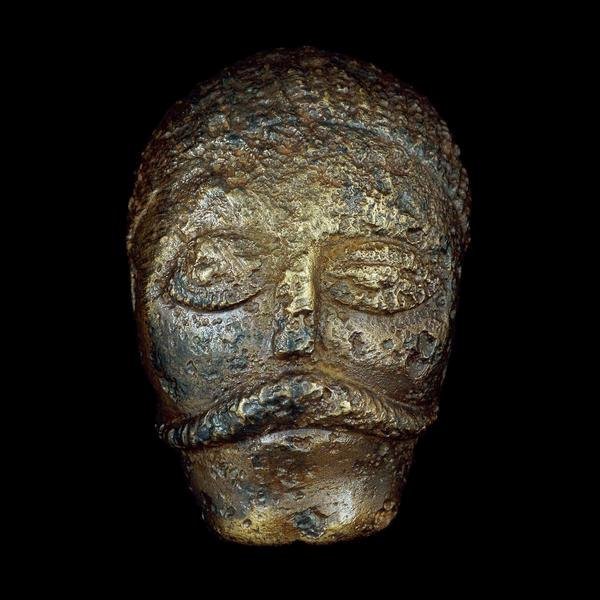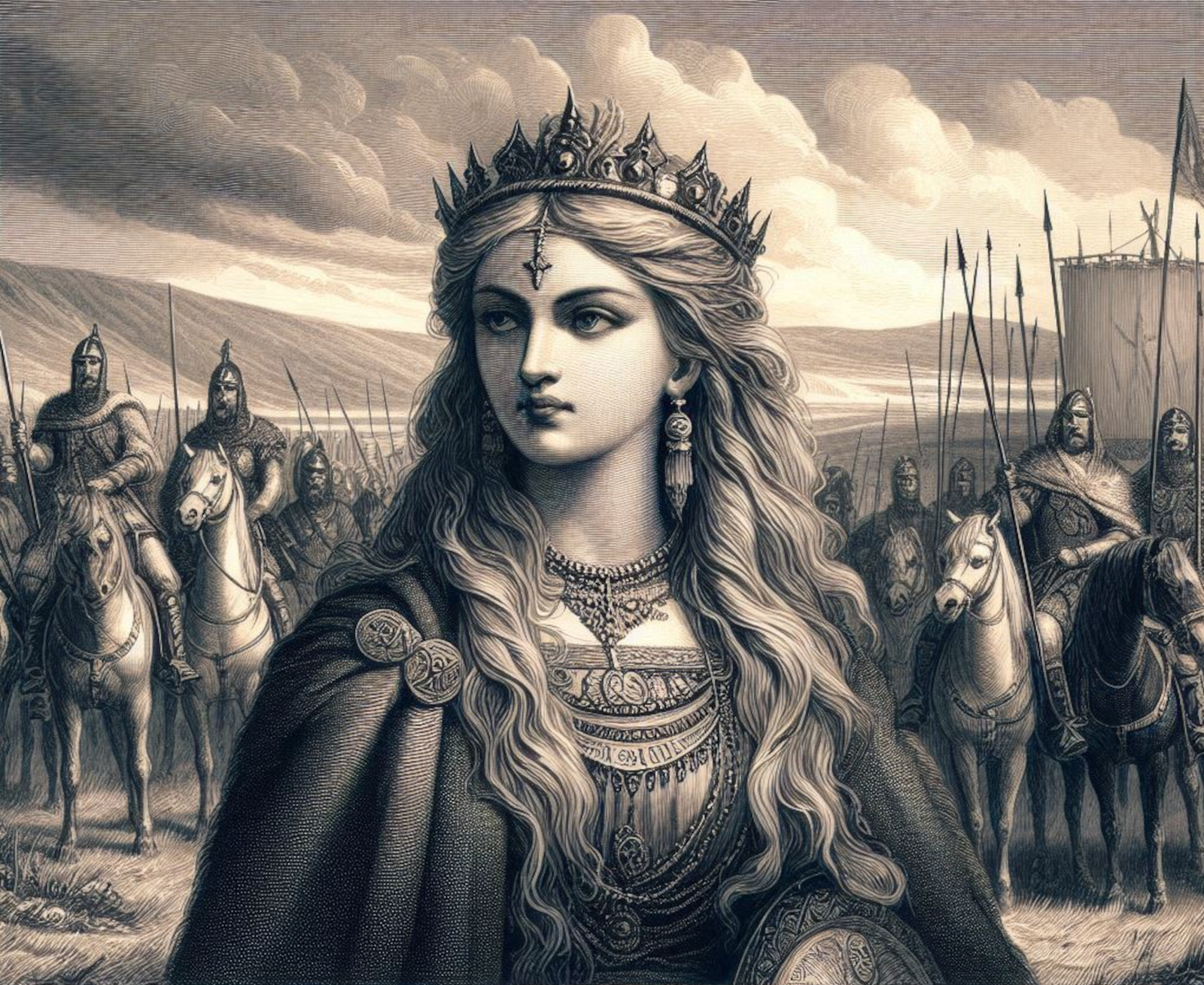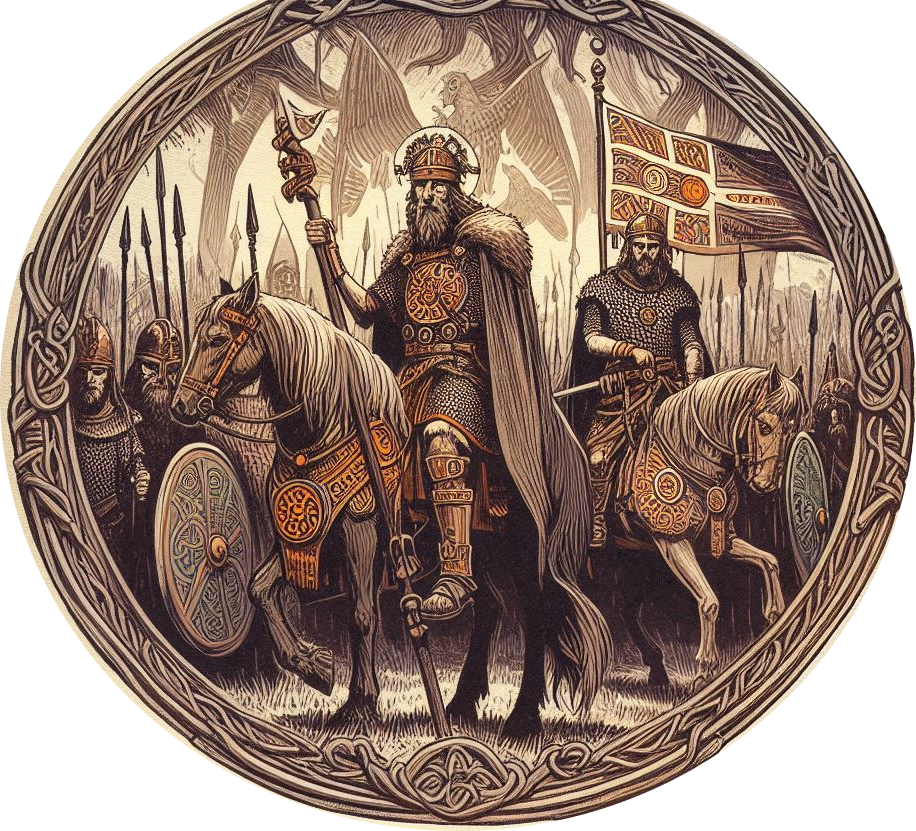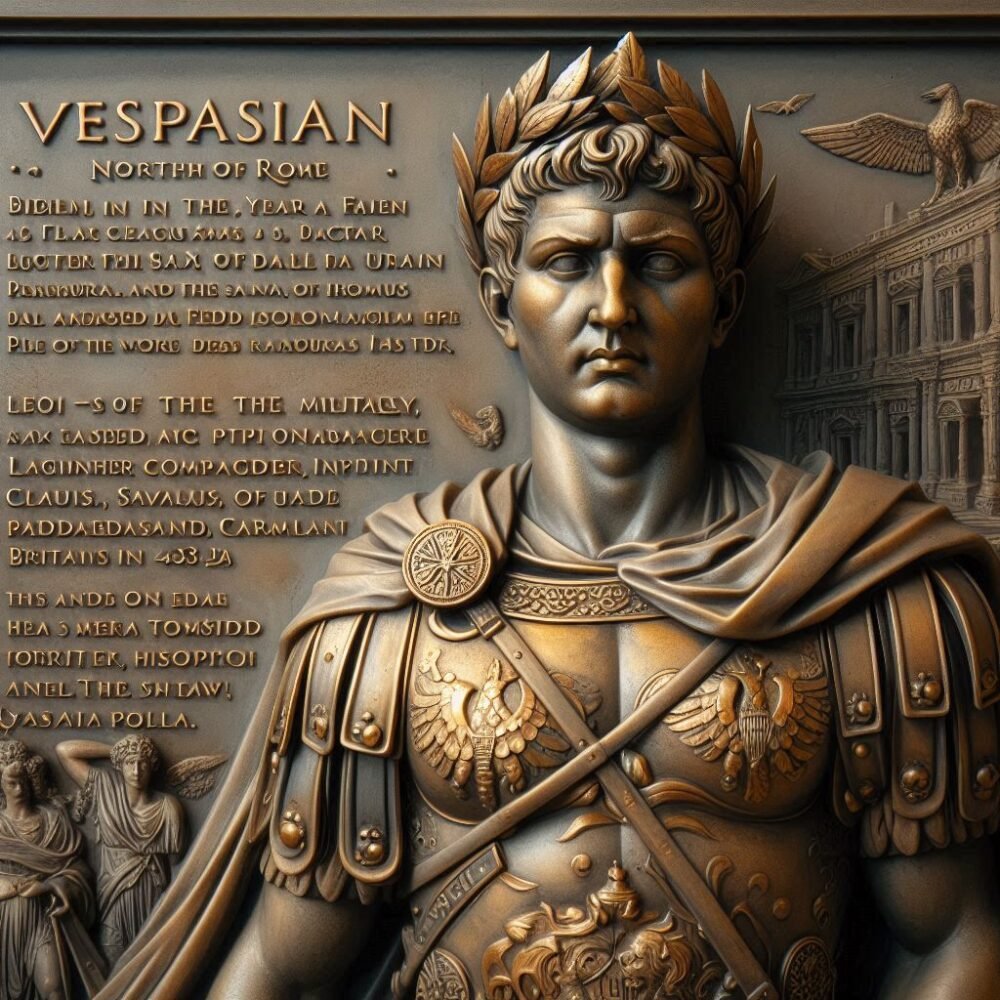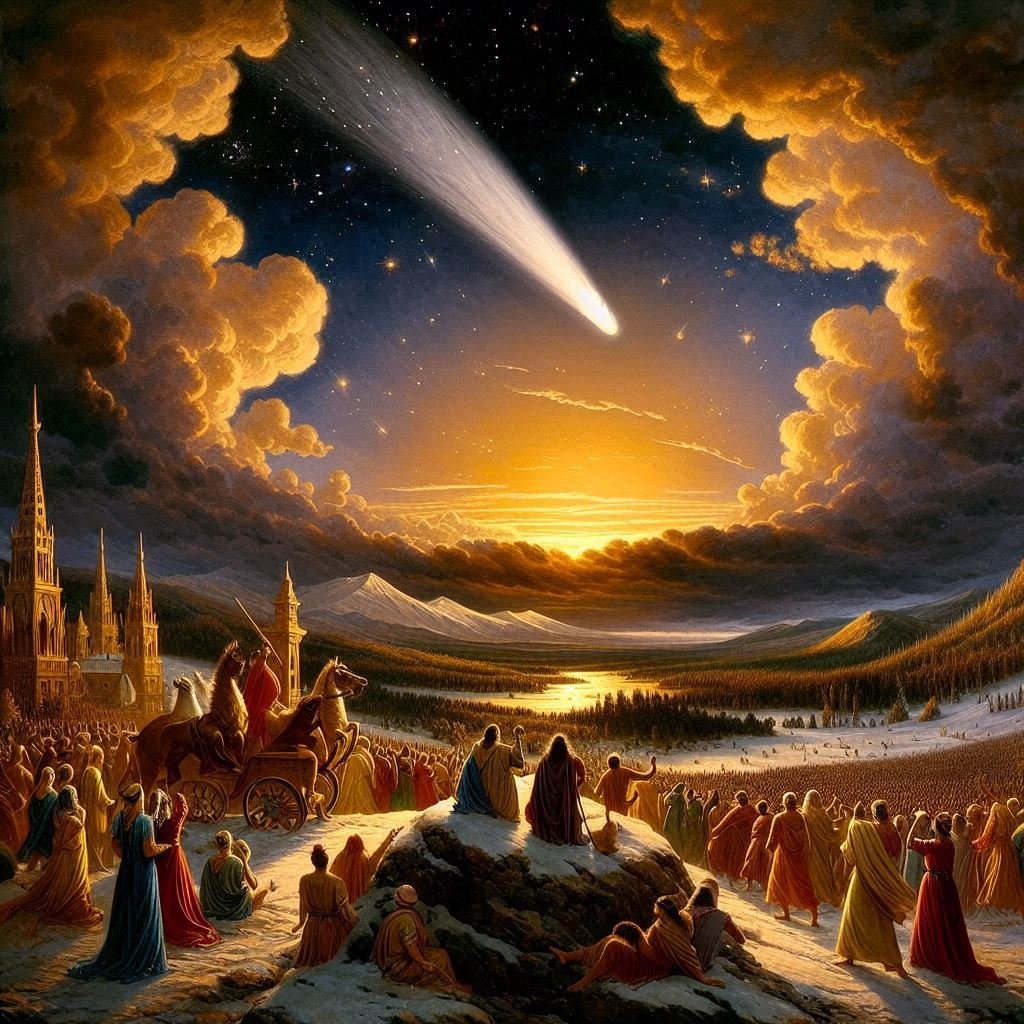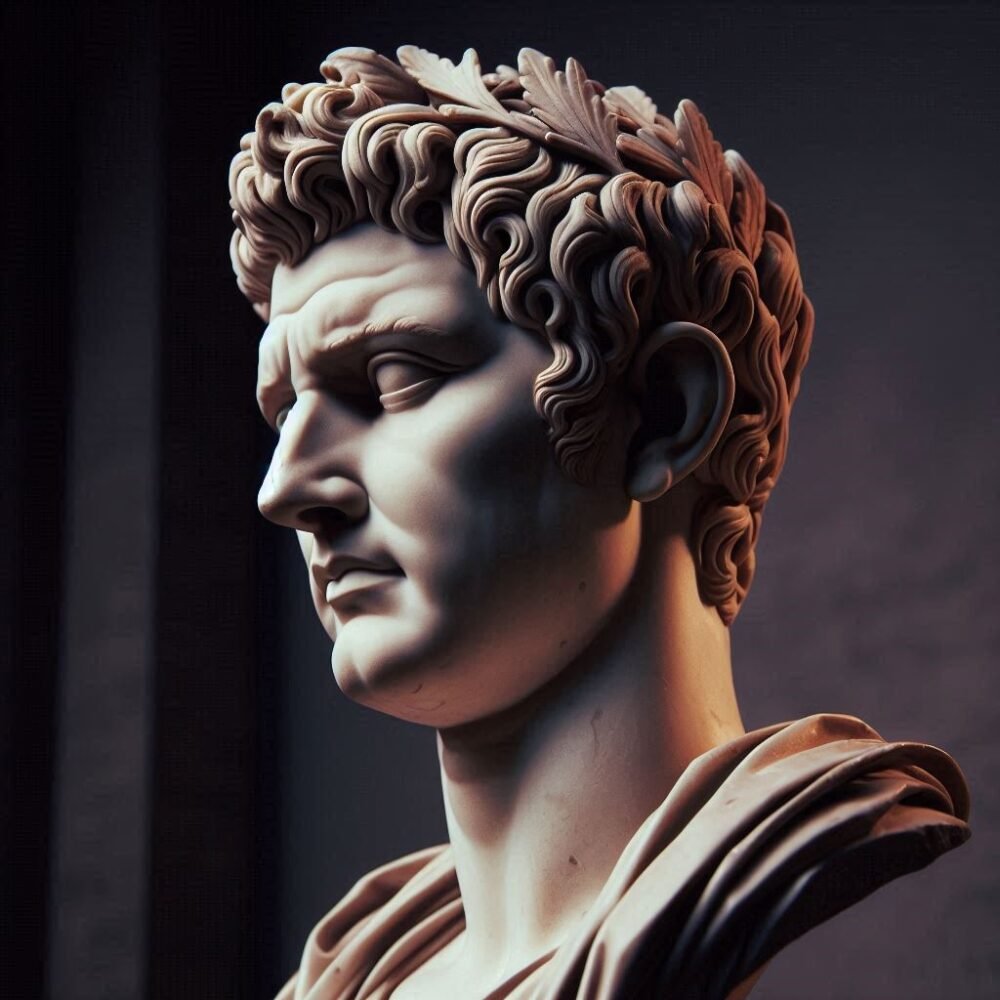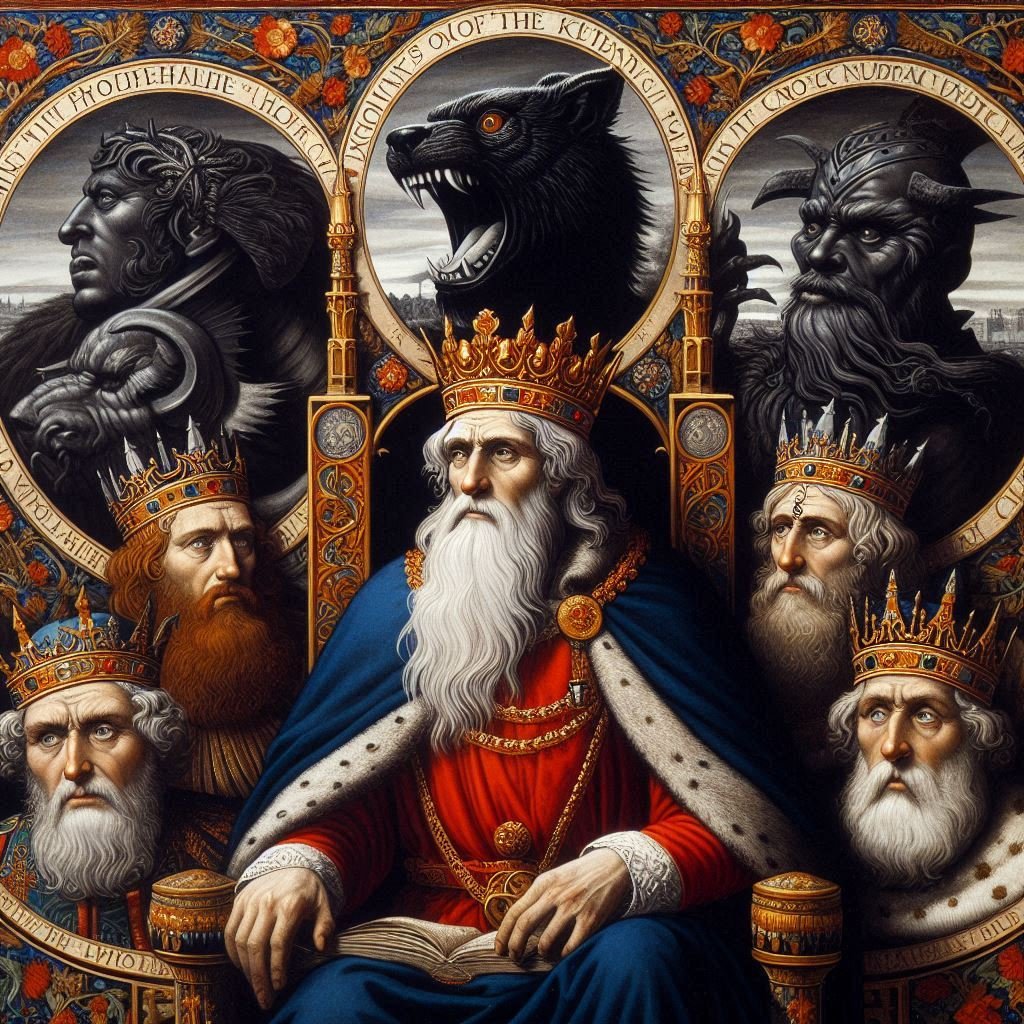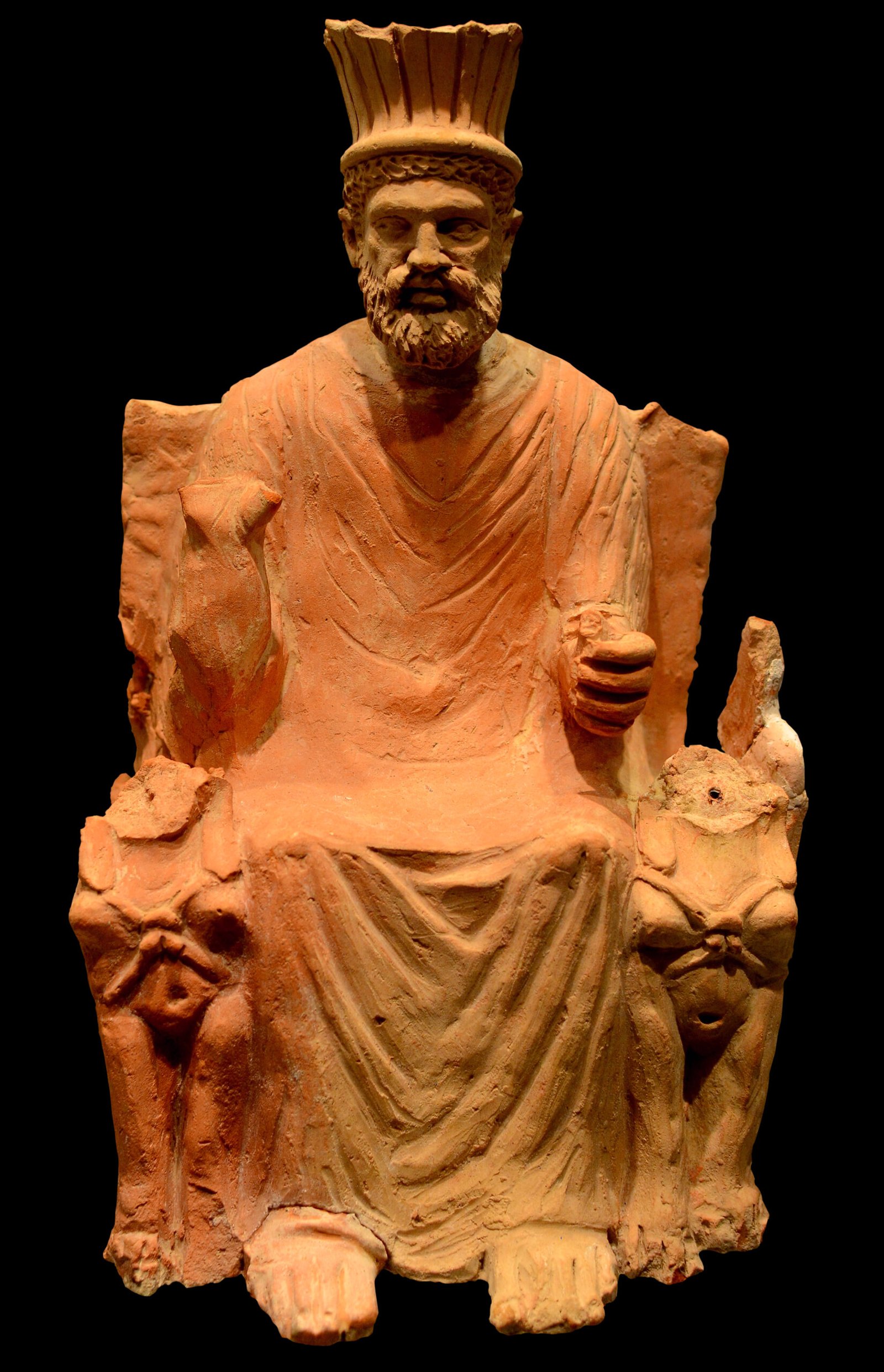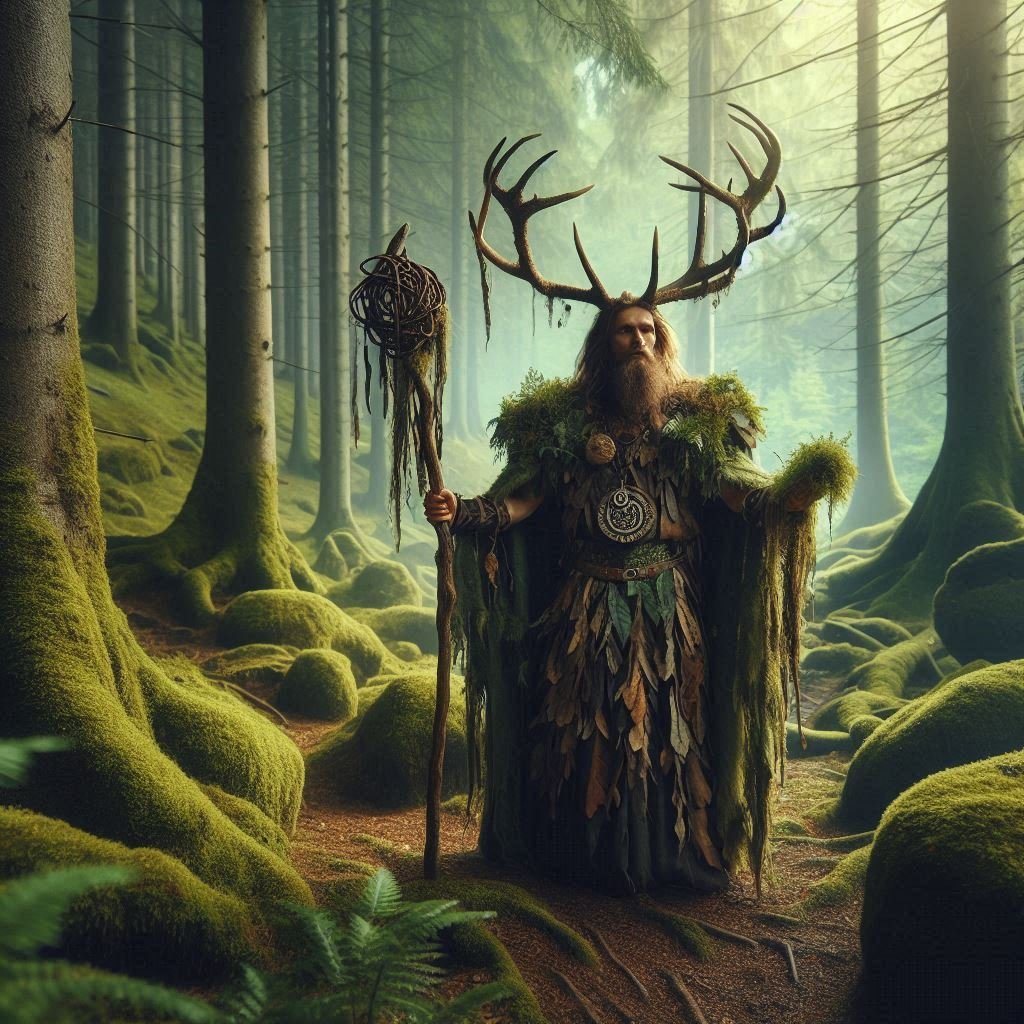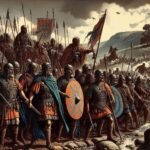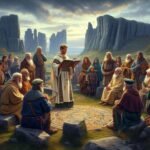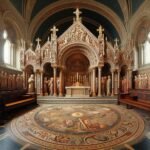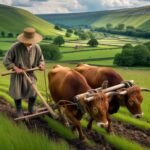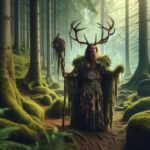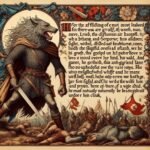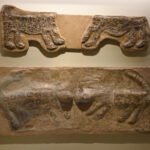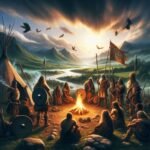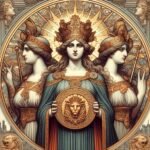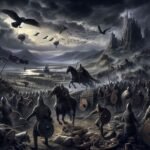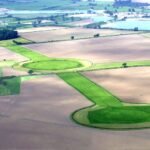Celtic Gods
The Celts are a subgroup of the Native British, Irish and European ethnic group collectively referred to as the White race. The Celts would not have called themselves Celts, the term derives from the Hellenic (Greek) and Roman terms given to them. Their history begins in Europe around 1,000 B.C.E. (Before the Common or Christian Era) and begins to fade out around 50 B.C.E. This is around the time when the Celts had been ‘pushed’ up into the British Isles. Then, the British Isles themselves, to a large extent, went under Roman occupation. Other subgroups of the Native European people, such as the Germanics, who included the Germans (obviously), the Saxons and the Norse (or Vikings) along with the Celts all came from the same original ancient Indo-Aryan roots. Those familiar with Germanic Mythology will notice a definite similarity between the Celtic and the Germanic Myths. The designs of the clothing, weapons etcetera are also near identical. Then, there is the Indo-European language tree etcetera.
Many Celtic deities seem to have been associated with aspects of nature and worshipped in sacred groves. Some appear in all Celtic areas while others have purely local significance. Many minor gods and goddesses are mentioned in inscriptions and sculptures, but Lugh, Epona and Cernunnos were among the most important. The Celtic oral tradition meant that the myths and legends were not written down until after the Christian church had been established in Britain, so the versions that exist were subject to its influence. The deities were changed into fairies and their powers into magic while the great festivals were included in the Christian calendar.
The Druids or priests were more important than the kings in Celtic society and their decisions were law. Even the king could not speak first. Their training took some years and there were special colleges in which philosophy, law, poems and stories were learnt by rote which preserved the mystery of Druidic doctrines. They were credited with supernatural powers of healing and prophecy and were believed to be able to enter the Otherworld.
God Worship in Roman Brigantia
Numerous inscriptions are found near the line of the Roman Wall, and in or near the Roman camps in Cumberland and Westmorland, addressed to the various deities worshipped by the legionary and auxiliary troops. These divide themselves into some four classes: first, those addressed to the gods and goddesses of the Roman mythology. Thus, many altars have been found in Cumberland dedicated to Jupiter, for instance, by the Dacians at Birdoswald, Lanercost, and Bewcastle; by the Tungrians at Castlesteads, by the Gauls at Old Carlisle; by the Spaniards at Maryport; by the Ala Augusta at Old Carlisle; and by other auxiliary troops elsewhere in the district, while many altars also occur dedicated to Jupiter by individuals.
It has been noted that altars to Jupiter are generally larger and more ornate than those to other gods. Dedications to Mars are by no means so numerous: they occur at Birdoswald, Castlesteads, Old Penrith, Old Carlisle and Brougham, and there was a temple to Mars at Carlisle. Dedications have also occurred to Hercules, to Silvanus the god of hunting, to Victory, personified as a goddess, and to other deities worshipped by the Romans in their own Italy. The genii of the camps and the cohorts, and of the emperors, the nymphs of the fountains, all have their altars. The size and workmanship of these altars, particularly those to Jupiter, lead to the idea that they were inspired by the Roman commanders, and belong to an early period of the occupation.15 The second class of these dedicatory inscriptions are to gods with strange uncouth names, the local gods of the Brythonic Celts.
These altars are generally small and rudely carved, indicating a late period of the occupation, and that they were the work of the rank and file of the Roman legions and their auxiliaries who had intermarried or cohabited with the native women, and so become acquainted with their gods. Thus in Cumberland altars have been found dedicated to Belutucador, to Mogontis, to Vetiris, to Maponus, and to Setlocenia: those to Belutucador have also been found in Westmorland. Some have endeavoured to identify this god with the Phoenician Baal, in which case he would belong to the next class: both he and Cocidius appear joined in dedications with Mars, and so may be Brythonic gods of war. Maponus is conjoined once or twice with Apollo, and may be his native equivalent.
These deities are frequent in, if not peculiar to, Cumberland, and must have been found there by the Romans. The third class consists of dedications to deities imported by the auxiliary troops. This class includes the deæ matres, whose altars and inscriptions are numerous in Belgic Gaul and in Germany, and especially along the banks of the Rhine. They belong to the Teutonic race, and are represented as three seated female figures, with baskets or bowls of fruit on their knees; instances occur, locally, of either dedications to or representations of the deæ matres at Brougham, Old Penrith, Stanwix, Carlisle, Netherby, &c. These are generally rude and poor in execution. The fourth class consists of slabs and sculptured figures, telling of the wave of Mithraic superstition that from the time of Hadrian swept from east to west. The great Mithraic find at Housesteads, in Northumberland, is outside the district we are dealing with, but sculptured stones, indicative of Mithraic worship, have been found at Drawdikes and Murrill Hill, both near Carlisle, and at Maryport.
The Celtic gods
Antenociticus The name of this Celtic god is known from three inscriptions found in a small shrine at Benwell near Newcastle-on-Tyne.
Brigit “The High One,” was patron deity of the Brigantes tribe in northern Britain. Associated with water and springs, she was also a goddess of poetry, learning, prophecy, and divination. Links with Minerva include a spear and globe. Another equivalent is the Irish goddess Brigit, namesake of St. Brigit. Long after the fall of the Brigantes as an independent force in Britain, the worship of Brigantia continued throughout the territory, as is witnessed by the many votive offerings found in the region, Halifax and South Shields for example. Flora and Fauna associated with Brigit.
Deae Matres (“Mother Goddesses”) Usually seen as a trinity, these fertility goddesses are often shown holding baskets of fruit, bread, or fish. The Deae Matres were also associated with water and sacred springs, and sometimes fused with local water deities such as Bath. Sculptures of the Matres also occur at Cirencester, Lincoln, and London.
Dea Nutrix Another form of Mother Goddess is “nursing mother” (Dea Nutrix). Clay statuettes of this goddess, mass-produced in Gaul and exported to Britain, show the young goddess seated in a high-backed wicker chair nursing one or two infants.
Epona The Celtic horse goddess, popular in Gaul and Germany, spread to a lesser extent to Britain via Roman cavalry troops. She is invoked in a small altar at Carvoran on Hadrian’s Wall. While always depicted with horses, Epona is sometimes also shown with grain and a patera (offering bowl), which tie her to fertility and prosperity rituals.
Mogons Dedications to this god, whom the Romans identified with Apollo, occur at several fort sites around Hadrian’s Wall, including Netherby, Vindolanda, Risingham, and Old Penrith. Mogons was probably a Germanic import, since the Latin name for Mainz is Mogontiacum.
Rosmerta A Celtic goddess usually found as a companion of the Celtic Mercury in Britain, Germany, and Gaul. She appears on a relief in the Gloucester Museum holding a patera over an altar.
Sulis The patron deity of Bath (Aquae Sulis), she was associated with water, hot springs, and healing. The temple at Bath was dedicated to a composite goddess, Sulis Minerva.
Taranis God of thunder and lightning (taren is Welsh for “thunder”), symbolized by a wheel. Known archaeologically in Gaul and Germany, and mentioned by the Roman poet Lucan in his play Pharsalia, he is linked to Jupiter in an altar from Chester.
Veteris A warrior god, may represent a group of deities. At least seven versions of the same name are recorded in 54 inscriptions, most from the eastern half of Hadrian’s Wall between Carvoran and Benwell. Based on the modest quality of these monuments, Veteris seems to represent a lower class cult. While linked at Netherby to the god Mogons, he is not identified with any Roman gods.
“Horned God” This unnamed god was widely dispersed in Britain, especially in the south, where he was frequently linked with the Roman god Mercury. He often appears with two short horns in uninscribed reliefs. Variants in Gaul have stag antlers, with one inscription from Roman Paris identifying him with Cemunnos (“the homed one”).
Cernunnos – God of the Underworld and of animals. He is depicted as a man with the antlers of a stag.
Taranis – God of the wheel, associated with forces of change.
Bel – Bel or Belenos, God of light.
Bran – Giant who delighted in battle and carnage. He was the son of Lir (or Llyr) and a mortal woman. He led the giants from Wales on their invasion of Ireland, being killed by a poisoned arrow in the battle with Evnissyen which followed the deposition of the Irish king.
Lugh – (Irish), Lugh or Lug was the God of light. He killed his grandfather, Balor, during the Great Battle in which a New Order of Gods and Goddesses took over from the primal beings of chaotic energy. He was the God of skill and ability.
Mabon – Son of Light, equated with the Roman Apollo. He was the God of liberation, harmony, MUSIC and unity. His festival is called Mabon, it is the Fall or Autumnal Equinox.
Gwydion – Son of Don, a master of fantasy and illusion, and the teacher of humans of all that is good and useful. He is a friend of Humanity and perpetually fights the Underworld powers for the good gifts they refuse to give to Humanity.
Nuada – (Gaulish) “He Of The Silver Hand” a God of war. The supreme God of the Gauls.
Nudd – Nudd or Lludd is a son of Beli. He was a sky God and is attributed with stopping three Supernatural plagues.
Oenghus – (Irish) God of fatal love and son of Daghdha and Boann.
Ogmios – God of the strength of poetry, charm and incantation. He is depicted as an old man carrying a club and a bow.
Amaethon – Son of Don and God of agriculture.
Angus Og – (Irish) God of love and beauty.
Bladud – (English) Father of King Lear, and was said to have founded Bath having been cured by it’s waters.
Manannan mac Lir – Manannan mac Lir, or Barinthus was the God of the ocean. He ferried the wounded King Arthur to the otherworld so that he could be cured.
Mark – King of Cornwall (now part of England) and uncle of Tristan, and suitor and husband of Isolde.
Naoise – (Irish) Husband of Deirdre. He was killed by his uncle Conchoba
Llyr – (Welsh) God of the sea, he relates to the Irish Lir.
Luchtaine – God of wheel making.
Gwyn ap Nudd – Gwyn ap Nudd, or Gwyn is the Lord of the Underworld and Master of the Wild Hunt. He lives at Glastonbury Tor.
Gwyrthur ap Greidawl – Gwyrthur ap Greidawl, or Gwyrthur is a rival to Gwyn ap Nudd for the affections of Creurdilad. He is a solar God, representing day.
Herne The Hunter – In English folklore, Herne The Hunter is the spirit of a hunter which guards travellers through Windsor Great Park. He wears the antlers of a stag upon his head. Herne was prominent in the tales of Robin Hood, although Windsor Great Park is nowhere near Sherwood Forest.
Dylan – God of darkness, a twin son of Gwydion and Arianrhod. He was a sea God, and swam like a fish. Upon his death at the hands of a spear thrown by his uncle Govannan, the sea for ever more wept for him in the form of waves crashing on the shore.
Finn MacCool – Irish prophet, warrior and healer. He learned his skills either from touching the flesh of Fintan as he cooked him, or by sipping the God’s wine as he served them at table.
Fintan – Shape changer. He was the only Irish survivor of Noah’s flood, changing into a hawk to soar above the waters and into a salmon to live in them. He ate the God’s magic hazlenuts and received all knowledge, but was netted in a salmon-trap and cooked for the God’s banquet by Finn MacCool who in doing touched Fintan’s flesh and absorbed the knowledge from Fintan turning him into a seer and healer on the spot.
Gawain – Son of King Lot of Orkney or the sun God Lug. Gawain was one of Arthur’s most loyal and noble followers. One New Year’s Eve a green giant rode into the hall at Camelot and challenged the bravest warrior there to cut off his head, and then one year later, to visit the giant’s castle to have his own head chopped off. Gawain accepted the challenge and decapitated the giant, who picked up his head and galloed away. One year later Gawain went in search off the giant and came to the castle of Lord Bertilak and was entertained there for three days and three nights. Each night Bertilak’s wife came to Gawain and tried to seduce him, and each time Gawain resisted her. On the fourth day, alone in the castle grounds Gawain came upon the giant and bent down to have his head cut off. Three times the giant swung the axe, and each time he stopped short, before disappearing and Bertilak stood in his place. Bertilak told Gawain that the entire thing had been a test set by Morgan le Fay to find the bravest of Arthur’s followers, and that each swing of the axe was for a night when he had resisted the attentions of Bertilak’s wife. Had he given in to temptation he would have died.
Aywell – Protector of the independant peoples of Northern England. He was the husband of Mm.
Camulus – In English Celtic Mythology, Camulus (Heaven) was a God of war identified by the Romans with Mars. He gave his name to the town of Camulodunum, now called Colchester.
Cuchulain – Celtic hero, the chief figure in a cycle of Irish legends. He is associated with his uncle Conchobar, King of Ulster; his most famous exploits are described in The Cattle Raid of Cuchulain.
Cuchulinn – Cuchulinn is a hero King of Ulster and son of Lugh. He is a warlike figure and tales tell of his warlike deeds.
Dagda – Dagda was the Celtic equivalent of Cronus. Also called Cian.
Daghdha – (Irish) Great God. He had a secret affair with Boann which resulted in the birth of Oenghus.
Conchobar – King of Ulster whose intended bride, Deidre, eloped with Noisi. Conchobar killed Deidre’s husband and his brothers and she died of sorrow.
Creidhne – God of metal working.
Diancecht – (Irish) God of healing. He destroyed the giant serpent that threatened and destroyed cattle throughout the land.
Dis – (Gaulish) God of death from whom the Gauls were descended.
Goibhniu – Smith God.
Govannan – Son of Don and God of smithcraft.
Gronw Pebyr – God of darkness.
Lir – Lir (or Lleyr or Llyr) was the Old Man of the Sea. He had four beautiful children which he doted on. After his wife died he married her sister who hated him and turned his children into swans, mute and aloof from him. By the time Lir had discovered what had happened to his children and reversed the spell they had aged into withered old people.
Lleu – God of light, a twin son of Gwydion and Arianrhod.
The Celtic Goddesses
Nemetona – Goddess of war.
Nimue – A shape changer who loved Merlin. After a contest of magic she captured him forever by turning herself into a drop of amber and engulfing him.
Penardum – Goddess of the sea married to Llyr.
Rosmerta – (Gaulish) Goddess of fire, warmth, wealth and abundance. A flower Queen and hater of marriage. She was the beldame of death.
Sulis – Goddess of prophesy, inspiration, wisdom and death.
Andraste – Warrior Goddess. She was invoked by Queen Boudicea (also called Boudicca) of the Iceni Tribe when she revolted against the Roman occupation of Britain around 61 C.E.
Arduina – Goddess of woodlands, wild life, the hunt and the moon; Guardian and Eponym of the Ardennes Forest.
Arianrhod – (Welsh) Arianrhod or Arianrod (Silver-Wheel or Silver-Circle) was the Virgin White Goddess of birth, initiation, death and rebirth. She who turns the circle of Heaven. She was a sister and wife of Gwydion.
Mm – Goddess of thought of the independant peoples of what is now Northern England. She never appeared alone, but always followed after her impetuous husband Aywell providing caution to his flashes of uncontrolled energy.
Morrighan – Morrighan or Morrigan. Goddess of war and death who could take the shape of a crow. Appears in the sky over battles and picks the warriors whom are to die.
Etain – Etain (Shining-One) was the Triple Goddess of the sun, water, horses, fragrance, beauty, music and the transmigration of souls.
Fata Morgana – (Irish) Goddess of the sea, visual illusions, enchantment, fate and death. She is the Queen of the Fortunate Isles.
Cordelia – (Welsh) She has two lovers, Gwyn ap Nudd and Gwyrthur ap Greidawl who fight for her on the 1st of May each year and will continue to do so until the day of doom when one shall be victorious and marry her.
Boann – (Irish) Goddess of rivers.
Branwen – Goddess of love. She was a daughter of Llyr.
Brighid – (Gaelic) Brighid or Brigit was the Goddess of metalwork, smiths, poetic inspiration and therapy. With Christianity she was changed into ‘Saint’ Brigit.
Cerridwen – (Welsh) Goddess of dark prophetic powers. She is the keeper of the cauldron of the Underworld, in which inspiration and divine knowledge are brewed.
Creurdilad – Daughter of Lludd and lover of Gwyn ap Nudd and Gwyrthur ap Greidawl. Her Mythology developed into that of Cordelia, with the names of her lovers also amending with time.
Deirdre – Beautiful intended bride of Conchobar. She eloped with NoÌsi, and died of sorrow when Conchobar killed him and his brothers.
Druantia – Goddess of birth, wisdom, death and metempsychosis. The mother of the Irish tree calendar alphabet.
Elaine – Virgin Goddess of beauty and the moon. She was the matron of road building and a loveable leader of hosts.
Epona – Goddess of horses.
Eriu – (Irish) Shapeshifting Goddess of fate. The bestower of sovereignty.
Geofon – Ocean Goddess.
Macha – (Irish) Goddess of athletic games, festivals and fertility.
Isolde – Isolde was the wife of King Mark of Cornwall who was brought from Ireland by his nephew Tristan. She and Tristan accidentally drank the aphrodisiac given to her by her mother for her marriage, were separated as lovers, and finally died together.
Guinevere – Guinevere or Guinever, is the French spelling of the Celtic name Gwynhwfar (‘White Cloud’). Gwynhwfar was a cloud Goddess who often, for mischief, took mortal form and entered the world of Humans to cause havoc. Soon after Arthur became King of Camelot, she entered the womb of a Roman princess whose husband ruled in Britain, and was born, as a beautiful mortal: Guinevere. In due course Arthur married her, against the advice of Merlin. Guinevere was the most beautiful woman in the world, and all Arthur’s knights would have had sex with her if they hadn’t been bound by their oaths of chivalry. Only Lancelot succumbed, and his and Guinevere’s adultery broke Arthur’s heart and led to the end of Camelot. When the company of the Round Table was broken up and its heroes disappeared into legend, Guinevere resumed her identity as Gwynhwfar, returned to the sky and has ever since been planning her next earthly manifestation.
Other Beings
Banshee – (Gaelic) Female spirit whose wailing outside a house foretells the death of one of its inhabitants.
Bebhionn – (Irish) Giantess from the Maiden’s Land far off the West coast of Ireland known for her beauty and seduction.
Badb – (Irish) Tall Giantess form of Morrighan.
Blodeuwedd – Wife of Lleu. She was created by Gwydion and Math from the blossoms of the oak, broom and meadow-sweet and presented to Lleu as a bride.
Another List of Gods
Notes on various Celtic Pantheons
Compiled by I. Marc Carlson
Celtic Gods – Ancient
—————————————-
Bolgios (Celtic) War God?
Brennos (Celtic) War God?
Epona (Celtic) Goddess of the Horse
Moccos (Celtic) Boar God
Tauros (Celtic) Bull God
Kernunnos (Celtic) Wild Nature, Sky God, Storms, the Hunt, the Dead, etc.
*Matrona (Celtic) Great Mother, Earth Goddess, Nature, Life
Theutates (Celtic) Wisdom?
Celtic Gods – Welsh/British
————————————————————————————————-
Alator (British) War God?
Andarta (British)Bear Goddess
Arawn (British) Lord of Anwyn. King of the Dead.
Arecurius (British)
Arionrod (British) “Silverwheel” The Moon
Artorios (British) Bear Goddess
Barrex (British)
Belatucadros (British – Selgovae) “Bright Beautiful One” War God?
Belinus (British) Bel, Belenos. Sun
Borvo (British) Bormo, Bormannos. Thermal Springs
Braciaca (British) War God.
Brigantia (British – Brigantii) Brigit. Tutalary Goddess. Life, Knowledge,
Wisdom, Home, Hearth
Bron/Bran (British)
Camulos (British – Belgic) War God
Cernenus (British – Cornavii)
Cernunnos (British) “Horned One” Horned God. Lord of the Animals or of all
living things. War God. Ruler of the Underworld. Wild Nature,
“Foundation of the World”
Horned god w/a bag of Grain
Cimialcinnus (British)Roads, Paths
Cocidius (British – Brigantes) War God; Wild Nature.
Condatis (Brtish) War God
Contrebus (British)
Coriotiacus (British – Trinovantes)
Damona (British)Divine Cow Goddess
*Donnos (British)”The Brown or Dark One”. Lord of the Dead. “Dis Pater”
Dylan (British) Waves
Emrys (British – Demetae) “Light” Dawn, the Wind
Epona (British – Epidii) “Great Mare” Horses
Esus (British) Aesus. Nature, Patron of Shepherds. Warrior. Ruler of the
Underworld.
*Gobbanos (British) Smith
Gofannon (British) Smith, Fire, the Forge
Grannos Sun, Healing
Gwynn ap Nudd. (British)(Cernunnos Aspect) Guardian of the Dead. King of the
Otherworld. Wild Huntsman. Chief of Tylweth Teg (Welsh Faeries) and
Ellyllon (elves)
Ialonus (British)
Latis (British)
Lenumius (British – Otadinii)
Lenus (British) War God. Goose God.
Leucetius (British) “The Shining One” or “Lighting” War God.
Lugus (British)”Shining One.” King of the Gods. Inventor of Arts, Skills,
War and Healing.
Lyr (British) The Sea (Tri God Aspect)
Magusanis (British)
Mapanos (British) “The Divine Child”
Matrona (British) “The Divine Mother”
Mongons (British) “The Great Hunter”
Morgan Mwynoaur (British) Sea. Shapechanger & Mage.
Mullo (British) Mules
Nantosuelta (British) Nantosvelta. Consort of Sucellus
Nemetius (British – Troveri) War God. Guardian of the Sacred Groves.
Nemetona (British – Nemetes / Troveri) Godddess of the Sacred Groves. War
goddess?
Nodens (British) Nudd/Ludd “Cloudmaker”, “Silver handed”. (Tri God Aspect)
King of the Tuatha. War. The Sea. [Maimed King]
Ocellos (British – Silures)
Ogmios (British) Champion of the Gods. Old Bald Guy, Lion’s Skin Club & Bow.
Great Strength, Poetry and eloquance. Guide of the dead.
Ratis (British) Goddess of Luck
Rhiannon (British)
Rigonemeta (British) Rigonometis. God of the Sacred Grove. War God. (Nemetius?)
Rudiobus (British) Horse God, Horsemanship
Saitada (British)
Secullos (British) “Good Striker”. Teutates. Storms? A river god. The God
with the Mallot, and Bowl of Abundance. God of the Underworld.
Setloceniua (British)
Silvanus (British) Guardian of the forests and Patron of Agriculture
Sirona (British) Healing Goddess
Sulis (British – [Bath]) Sul. Minerva Warm Springs
Taranos (British) Taranis; Turannos. “Thunderer” Lightning, Thunder, Storms.
Ruler of the Underworld. Has a Big Wheel.
Teutates (British) Toutatis; Totatis. “God of the People.” ie, Secullos. War
God of Brigantes. May be same as Cernunnos.
Ursula of the Silver Host (British) Swanmaiden
Vellaunus (British) War God?
Vitiris (British – Selgovae) War God?
Celtic Gods – Gallic
————————————————————————————————-
Alator (Gaulic) War God?
Andarta (Gaulic)Bear Goddess
Arawn (Gaulic) Lord of Anwyn. King of the Dead.
Arecurius (Gaulic)
Arionrod (Gaulic) “Silverwheel” The Moon
Artorios (Gaulic) Bear Goddess
Barrex (Gaulic)
Belatucadros (Gaulic – Selgovae) “Bright Beautiful One” War God?
Belinus (Gaulic) Bel, Belenos. Sun
Borvo (Gaulic) Bormo, Bormannos. Thermal Springs
Braciaca (Gaulic) War God.
Brigantia (Gaulic – Brigantii) Brigit. Tutalary Goddess. Life, Knowledge,
Wisdom, Home, Hearth
Bron/Bran (Gaulic)
Camulos (Gaulic – Belgic) War God
Cernenus (Gaulic – Cornavii)
Cernunnos (Gaulic) “Horned One” Horned God. Lord of the Animals or of all
living things. War God. Ruler of the Underworld. Wild Nature,
“Foundation of the World”
Horned god w/a bag of Grain
Cimialcinnus (Gaulic)Roads, Paths
Cocidius (Gaulic – Brigantes) War God; Wild Nature.
Condatis (Brtish) War God
Contrebus (Gaulic)
Coriotiacus (Gaulic – Trinovantes)
Damona (Gaulic)Divine Cow Goddess
*Donnos (Gaulic)”The Brown or Dark One”. Lord of the Dead. “Dis Pater”
Dylan (Gaulic) Waves
Emrys (Gaulic – Demetae) “Light” Dawn, the Wind
Epona (Gaulic – Epidii) “Great Mare” Horses
Esus (Gaulic) Aesus. Nature, Patron of Shepherds. Warrior. Ruler of the
Underworld.
*Gobbanos (Gaulic) Smith
Gofannon (Gaulic) Smith, Fire, the Forge
Grannos Sun, Healing
Gwynn ap Nudd. (Gaulic)(Cernunnos Aspect) Guardian of the Dead. King of the
Otherworld. Wild Huntsman. Chief of Tylweth Teg (Welsh Faeries) and
Ellyllon (elves)
Ialonus (Gaulic)
Latis (Gaulic)
Lenumius (Gaulic – Otadinii)
Lenus (Gaulic) War God. Goose God.
Leucetius (Gaulic) “The Shining One” or “Lighting” War God.
Lugus (Gaulic)”Shining One.” King of the Gods. Inventor of Arts, Skills,
War and Healing.
Lyr (Gaulic) The Sea (Tri God Aspect)
Magusanis (Gaulic)
Mapanos (Gaulic) “The Divine Child”
Matrona (Gaulic) “The Divine Mother”
Mongons (Gaulic) “The Great Hunter”
Morgan Mwynoaur (Gaulic) Sea. Shapechanger & Mage.
Mullo (Gaulic) Mules
Nantosuelta (Gaulic) Nantosvelta. Consort of Sucellus
Nemetius (Gaulic – Troveri) War God. Guardian of the Sacred Groves.
Nemetona (Gaulic – Nemetes / Troveri) Godddess of the Sacred Groves. War
goddess?
Nodens (Gaulic) Nudd/Ludd “Cloudmaker”, “Silver handed”. (Tri God Aspect)
King of the Tuatha. War. The Sea. [Maimed King]
Ocellos (Gaulic – Silures)
Ogmios (Gaulic) Champion of the Gods. Old Bald Guy, Lion’s Skin Club & Bow.
Great Strength, Poetry and eloquance. Guide of the dead.
Olloudius (Gaulic – Narbonenses) War God
Ratis (Gaulic) Goddess of Luck
Rhiannon (Gaulic)
Rigisaumus (Gaulic) War God
Rigonemeta (Gaulic) Rigonometis. God of the Sacred Grove. War God. (Nemetius?)
Rudiobus (Gaulic) Horse God, Horsemanship
Saitada (Gaulic)
Secullos (Gaulic) “Good Striker”. Teutates. Storms? A river god. The God
with the Mallot, and Bowl of Abundance. God of the Underworld.
Segomo (Gaulic) War God
Setloceniua (Gaulic)
Silvanus (Gaulic)Guardian of the forests and Patron of Agriculture
Sirona (Gaulic)Healing Goddess
Sulis (Gaulic – [Bath]) Sul. Minerva Warm Springs
Taranos (Gaulic) Taranis; Turannos. “Thunderer” Lightning, Thunder, Storms.
Ruler of the Underworld. Has a Big Wheel.
Teutates (Gaulic) Toutatis; Totatis. “God of the People.” ie, Secullos. War
God of Brigantes. May be same as Cernunnos.
Vellaunus (Gaulic) War God?
Vitiris (Gaulic – Selgovae) War God?


